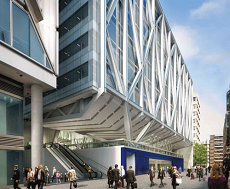March 30, 2015
Driverless cars will transform the UK economy by 2030, claims report
 A new study from the Society of Motor Manufacturers and Traders (SMMT) and KPMG claims that the development of connected and autonomous vehicles will help generate 320,000 jobs in the UK and deliver huge benefits to society and the economy. The first ever comprehensive analysis of the opportunities provided by the new technology claims that by 2030 driverless cars will deliver a £51 billion boost to the UK economy, reduce congestion and carbon emissions and cut serious road traffic accidents by more than 25,000. By that time all new cars will incorporate some form of connectivity, according to the report’s authors. It also predicts that the UK will be a global leader in the production of this next generation of vehicles, with the support of Government including financial backing. The study was presented at last week’s SMMT conference in London.
A new study from the Society of Motor Manufacturers and Traders (SMMT) and KPMG claims that the development of connected and autonomous vehicles will help generate 320,000 jobs in the UK and deliver huge benefits to society and the economy. The first ever comprehensive analysis of the opportunities provided by the new technology claims that by 2030 driverless cars will deliver a £51 billion boost to the UK economy, reduce congestion and carbon emissions and cut serious road traffic accidents by more than 25,000. By that time all new cars will incorporate some form of connectivity, according to the report’s authors. It also predicts that the UK will be a global leader in the production of this next generation of vehicles, with the support of Government including financial backing. The study was presented at last week’s SMMT conference in London.



























March 11, 2015
How a big, stupid idea can be more attractive than a small, effective one
by Mark Eltringham • Architecture, Comment, Property
We’re going to be hearing a lot of big ideas over the next few weeks. Politicians will be sharing their ‘visions’ with us and letting us know exactly how ‘passionate’ they are about them and anything else Twitter tells them we care about. It’s going to be boring and infuriating, but we only have ourselves to blame. We fret when politicians don’t give us a handy label on which we can rest our hopes or lay the blame, depending on whether we agree with whatever the big idea is or not. Of course, David Cameron’s vision of choice when he became Prime Minister in 2010 was The Big Society. I won’t get into the rights and wrongs of that but I think we can all agree that The Big Society has been kicked unceremoniously into The Long Grass and we won’t be hearing much about it in the build up to this year’s General Election. Nor will we be hearing much about another of David Cameron’s pet projects even though that has actually gone on to be something of a success.
More →